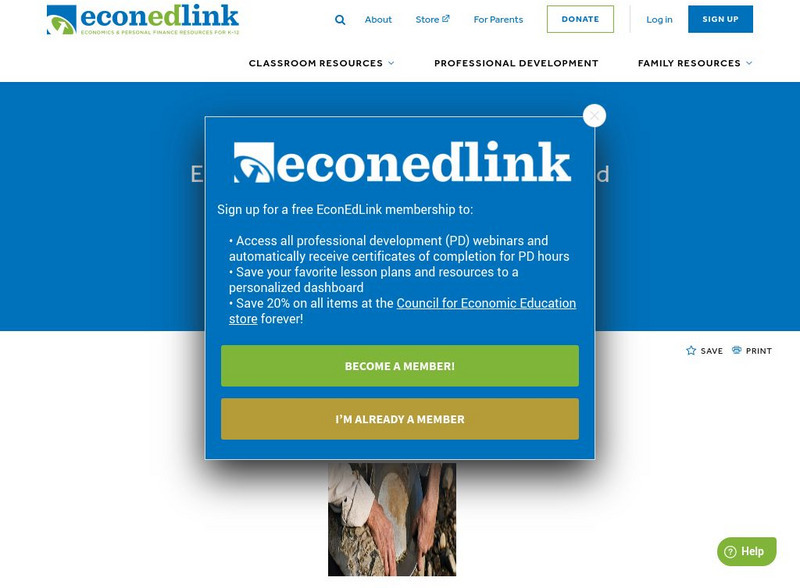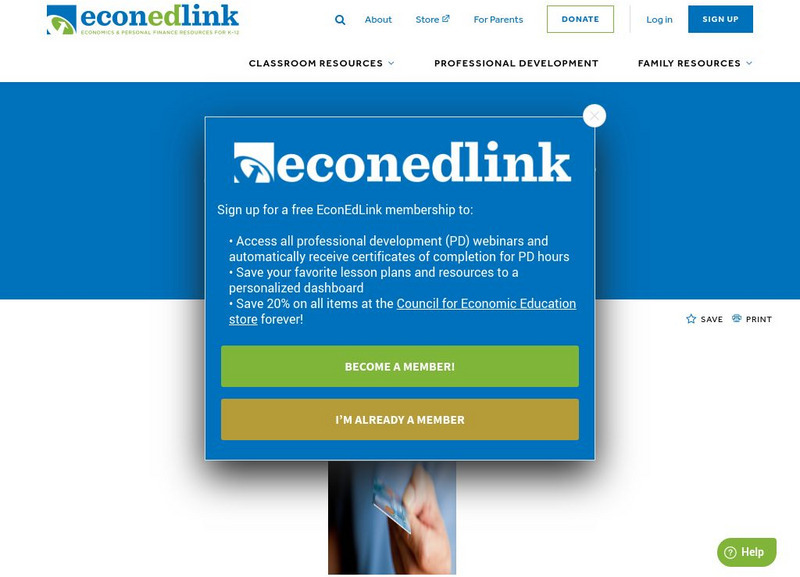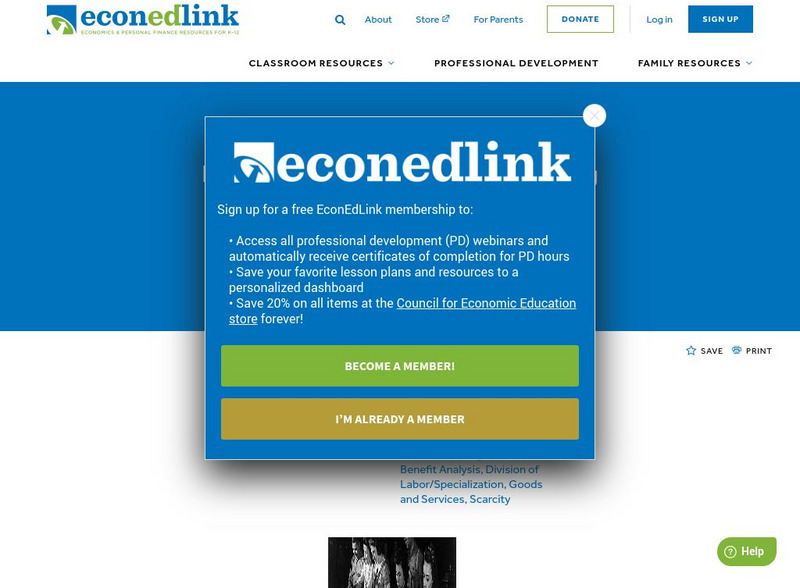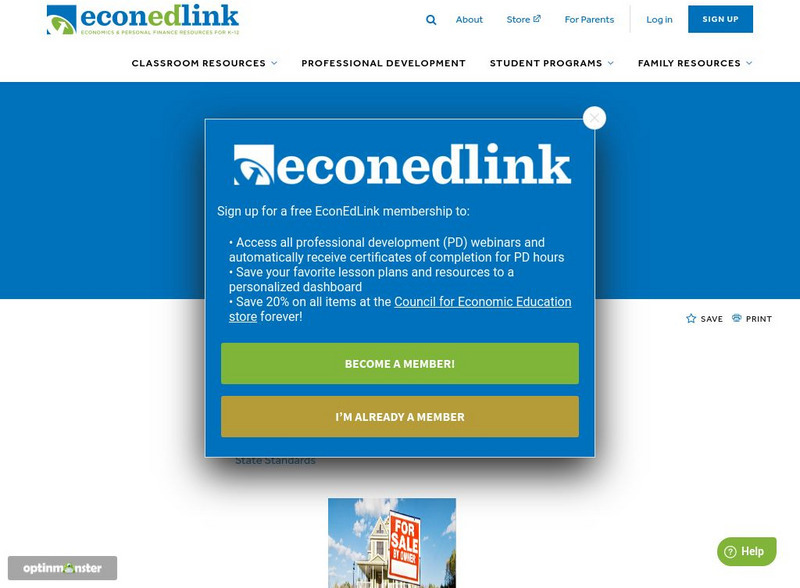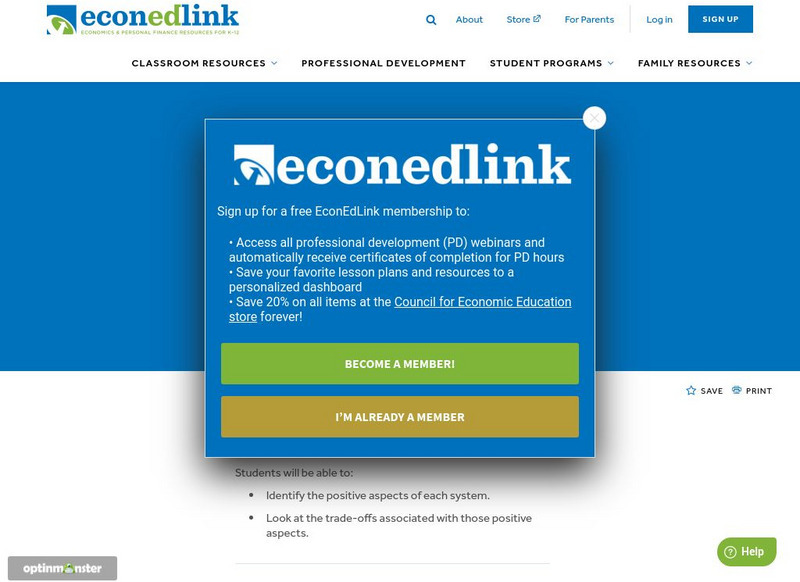Council for Economic Education
Econ Ed Link: Everyday Opportunities
In this lesson, students will learn about choices and opportunity costs that occur every day. While this lesson will go on throughout the day, the actual lesson is short.
Council for Economic Education
Econ Ed Link: Clipping Coupons
In this lesson, students will calculate savings for different products when using coupons. They will also decide what factors will influence the choices they make when choosing products.
Council for Economic Education
Econ Ed Link: No Funny Money, Honey I Want the Real Thing!
Do you know what funny money is? It's NOT the real thing! Find out how our government tries to make our money hard to copy in this lesson about real and fake money.
Council for Economic Education
Econ Ed Link: Be All You Can Be for Minimum Wage? (Student Page)
This lesson ask students to calculate the percentage change in military strength over the last two decades, hypothesize economic (and non-economic) explanations for these changes, test hypothetical explanations by reading an economic...
Council for Economic Education
Econ Ed Link: Do I Look Like I'm Made of Money?
One of the most common replies given by parents when their children ask for money is "Do I look like I'm made of Money?" This lesson is designed to educate young scholars about the need for money as a generally accepted medium of...
Council for Economic Education
Econ Ed Link: Mystery Workers: Productive Resources
This website focuses on productive resources which are divided into three categories, natural, human, and capital.
Council for Economic Education
Econ Ed Link: Agent Pincher: The Case of the Ufo
Agent Pincher: The Case of the UFO--Unfamiliar Foreign Objects. That is what currency from another country may look like. Sometimes when people first try to use money from another country, they feel like they are playing with toy...
Council for Economic Education
Econ Ed Link: The Economics of Income: Which 'Wood' You Choose?
A key turning point in a nation's economic development is when it starts to use its resources for long term versus short term purposes. A natural resource example is trees: should people use wood for cooking food or building homes?...
Council for Economic Education
Econedlink: Scarcity Video and Quiz
This video teaches the concept of Scarcity and includes a quiz. The total resources of society, including natural resources, human resources, capital goods and entrepreneurship, are limited, causing scarcity to exist. [1:13]
Council for Economic Education
Econ Ed Link: Those Golden Jeans
Check out this informative economics lesson plan designed to review the three productive resources--natural resources, human resources, and capital resources--needed to produce goods and services.
Council for Economic Education
Econ Ed Link: We Are Consumers and Producers
This lesson plan is geared toward beginning economics concepts. "In this lesson you are going to learn more about how you and others are consumers and producers."
Council for Economic Education
Econ Ed Link: Worker Safety the Triangle Fire Legacy
Find out more about the 1911 New York Triangle Shirtwaist Factory Fire and how it affects workplace safety today. Included are case histories of contemporary examples of unsafe work conditions, a worksheet to use for analysis, and...
Council for Economic Education
Econ Ed Link: Economic Spotter: Supply and Demand at the Gold Rush
During the Gold Rush, people paid exorbitant prices for ordinary objects. Why? Because of the laws of supply and demand, that's why! In the lesson, students will see how these laws fit into this great historical time.
Council for Economic Education
Econ Ed Link: What Is Competition?
Explore the world of competition in business through this informative lesson plan.
Council for Economic Education
Econ Ed Link: Clickety Clack, Let's Keep Track!
This lesson will show students the importance of keeping track of their savings.
Council for Economic Education
Econ Ed Link: My Credit Rating: Why Should I Care?
Credit is a wonderful tool for the consumer. It can enhance your quality of life. It enables you to buy and enjoy a purchase before you have the money to pay for it. On the other hand, it can create serious problems for people who use it...
Council for Economic Education
Econ Ed Link: Giving Credit
This life lesson will prepare learners for the world of credit. "In this lesson, you will analyze the creditworthiness of people who want to borrow. You will also learn how to identify ways to establish your creditworthiness."
Council for Economic Education
Econ Ed Link: Giving Credit
This lesson plan introduces the role and importance of the 3 C's - capacity, character, and collateral - to being granted credit. An online story about a girl who fails to return soccer shin guards borrowed from a friend is used to spark...
Council for Economic Education
Econ Ed Link: Lean on Me We Depend on Each Other
Check out this website to learn more about the economy, specialization, and the reasons assembly lines are used.
Council for Economic Education
Econ Ed Link: Lean on Me We Depend on Each Other!
The purpose of this activity is to demonstrate that the production of most goods can be broken down into a number of specific tasks (division of labor), with each of these tasks assigned to specific workers (specialization.)
Council for Economic Education
Econ Ed Link: Economic Spotter: Resources During World War Ii
In World War II pennies were made of steel and zinc instead of copper and women were working at jobs that men had always been hired to do. Why? Because during war times, scarcity forces many things to change!
Council for Economic Education
Econ Ed Link: Buying vs. Renting
Have you given any thought to where you will live when you are "on your own" - out in the world earning a living? You will have many decisions to make as you look for a place to call home. In this lesson, your basic economic decision...
Council for Economic Education
Econ Ed Link: Car Loan Project
Each student will buy (hypothetically) a car that will need to be financed. The student will need to look at different options and decide which will be the best choice for his situation. The student will need to find an advertisement for...
Council for Economic Education
Econ Ed Link: The Price We Pay for Health: Us and Canada
Students will review the health systems of United States and Canada. They will identify the positive aspects of each system. They will look at the trade-offs associated with those positive aspects. In Canada, everyone has health care,...










